Millennial Influence on Workplace Culture: AMPCO Dissertation Study
VerifiedAdded on 2023/06/10
|65
|13415
|292
Thesis and Dissertation
AI Summary
This dissertation examines the influence of millennials, also known as Generation Y, on shaping the workplace culture, with a specific focus on the Atlantic Methanol Production Company System (AMPCO). The study investigates the characteristics of millennials, their impact on organizational cultures, and the challenges and opportunities they present. The research includes a literature review on millennial traits, organizational culture types, and the influence of millennials on reshaping the workplace. The methodology section details the research philosophy, approach, design, data collection methods (including quantitative questionnaires), sampling, and data analysis techniques. The findings and analysis section presents the results of the quantitative questionnaire, including questions on millennials and organizational culture, and regression analysis. The dissertation concludes with recommendations for mitigating emerging issues related to cultural changes within AMPCO and identifies limitations and future research scope. The study highlights the shift in values and company culture to meet the demands of millennials, emphasizing the importance of understanding their influence on the future of work. The research aims to identify the influence of millennials in shaping the corporate culture of Atlantic Methanol Production Company System and recognize the changes brought to the company due to the diverse working styles and individual personality traits of the millennial.
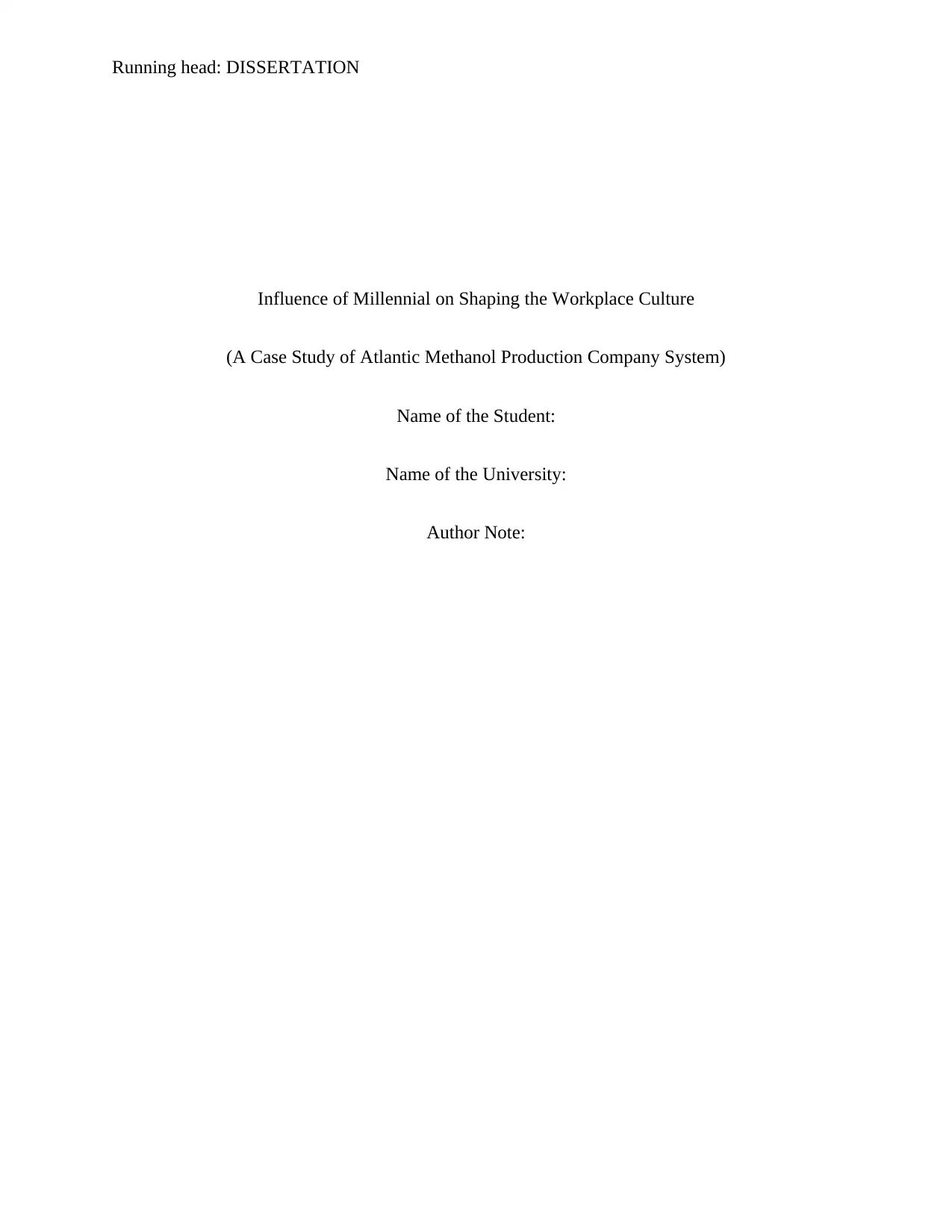
Running head: DISSERTATION
Influence of Millennial on Shaping the Workplace Culture
(A Case Study of Atlantic Methanol Production Company System)
Name of the Student:
Name of the University:
Author Note:
Influence of Millennial on Shaping the Workplace Culture
(A Case Study of Atlantic Methanol Production Company System)
Name of the Student:
Name of the University:
Author Note:
Paraphrase This Document
Need a fresh take? Get an instant paraphrase of this document with our AI Paraphraser
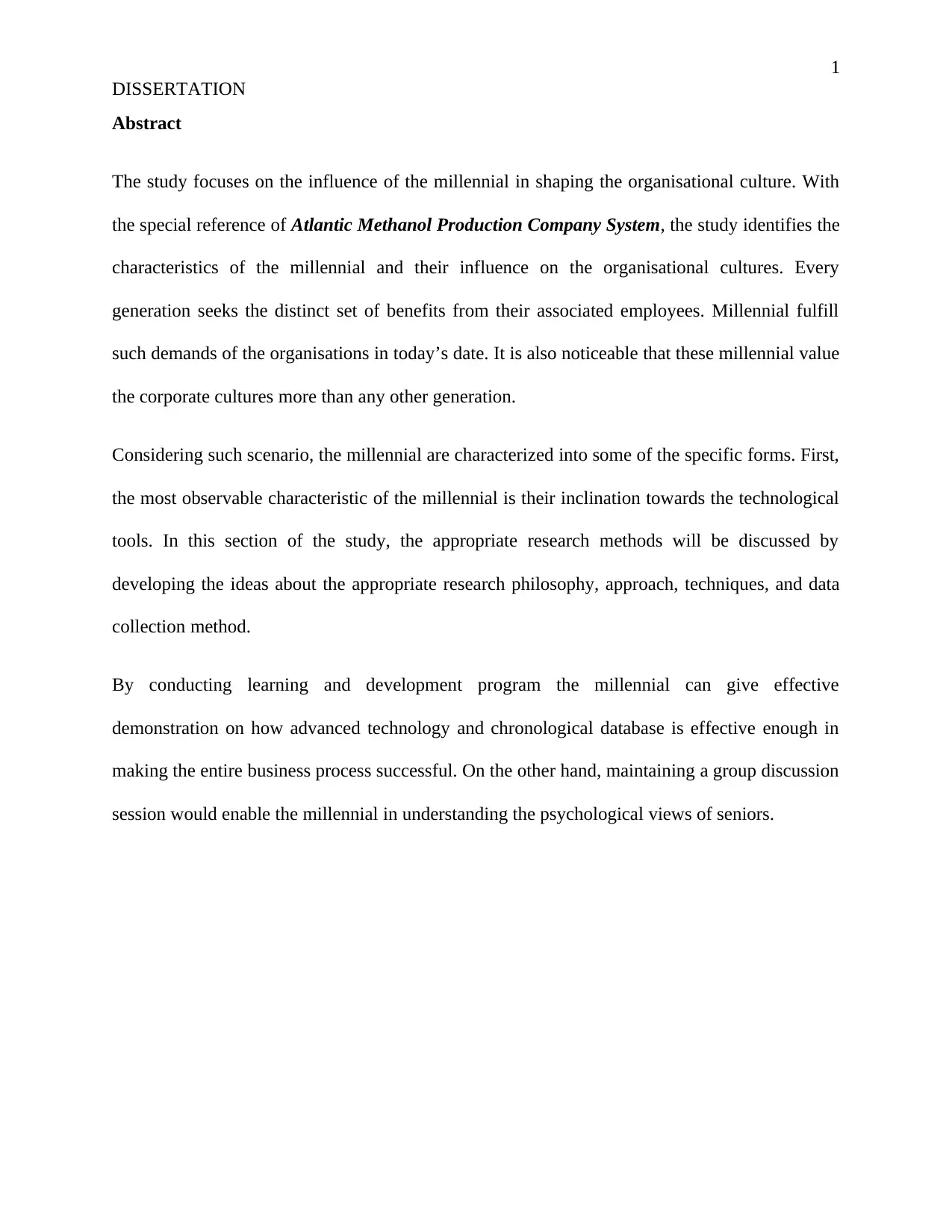
1
DISSERTATION
Abstract
The study focuses on the influence of the millennial in shaping the organisational culture. With
the special reference of Atlantic Methanol Production Company System, the study identifies the
characteristics of the millennial and their influence on the organisational cultures. Every
generation seeks the distinct set of benefits from their associated employees. Millennial fulfill
such demands of the organisations in today’s date. It is also noticeable that these millennial value
the corporate cultures more than any other generation.
Considering such scenario, the millennial are characterized into some of the specific forms. First,
the most observable characteristic of the millennial is their inclination towards the technological
tools. In this section of the study, the appropriate research methods will be discussed by
developing the ideas about the appropriate research philosophy, approach, techniques, and data
collection method.
By conducting learning and development program the millennial can give effective
demonstration on how advanced technology and chronological database is effective enough in
making the entire business process successful. On the other hand, maintaining a group discussion
session would enable the millennial in understanding the psychological views of seniors.
DISSERTATION
Abstract
The study focuses on the influence of the millennial in shaping the organisational culture. With
the special reference of Atlantic Methanol Production Company System, the study identifies the
characteristics of the millennial and their influence on the organisational cultures. Every
generation seeks the distinct set of benefits from their associated employees. Millennial fulfill
such demands of the organisations in today’s date. It is also noticeable that these millennial value
the corporate cultures more than any other generation.
Considering such scenario, the millennial are characterized into some of the specific forms. First,
the most observable characteristic of the millennial is their inclination towards the technological
tools. In this section of the study, the appropriate research methods will be discussed by
developing the ideas about the appropriate research philosophy, approach, techniques, and data
collection method.
By conducting learning and development program the millennial can give effective
demonstration on how advanced technology and chronological database is effective enough in
making the entire business process successful. On the other hand, maintaining a group discussion
session would enable the millennial in understanding the psychological views of seniors.
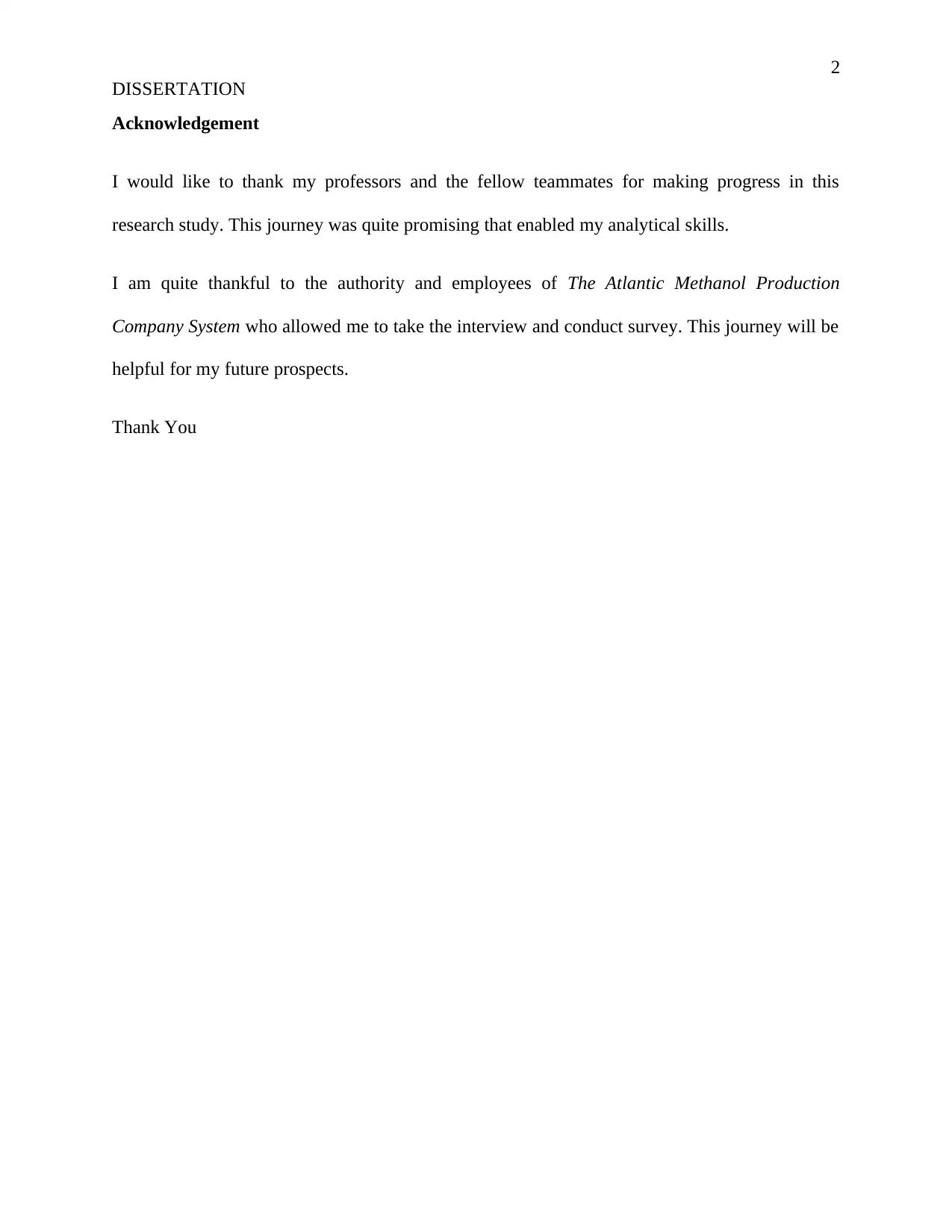
2
DISSERTATION
Acknowledgement
I would like to thank my professors and the fellow teammates for making progress in this
research study. This journey was quite promising that enabled my analytical skills.
I am quite thankful to the authority and employees of The Atlantic Methanol Production
Company System who allowed me to take the interview and conduct survey. This journey will be
helpful for my future prospects.
Thank You
DISSERTATION
Acknowledgement
I would like to thank my professors and the fellow teammates for making progress in this
research study. This journey was quite promising that enabled my analytical skills.
I am quite thankful to the authority and employees of The Atlantic Methanol Production
Company System who allowed me to take the interview and conduct survey. This journey will be
helpful for my future prospects.
Thank You
⊘ This is a preview!⊘
Do you want full access?
Subscribe today to unlock all pages.

Trusted by 1+ million students worldwide
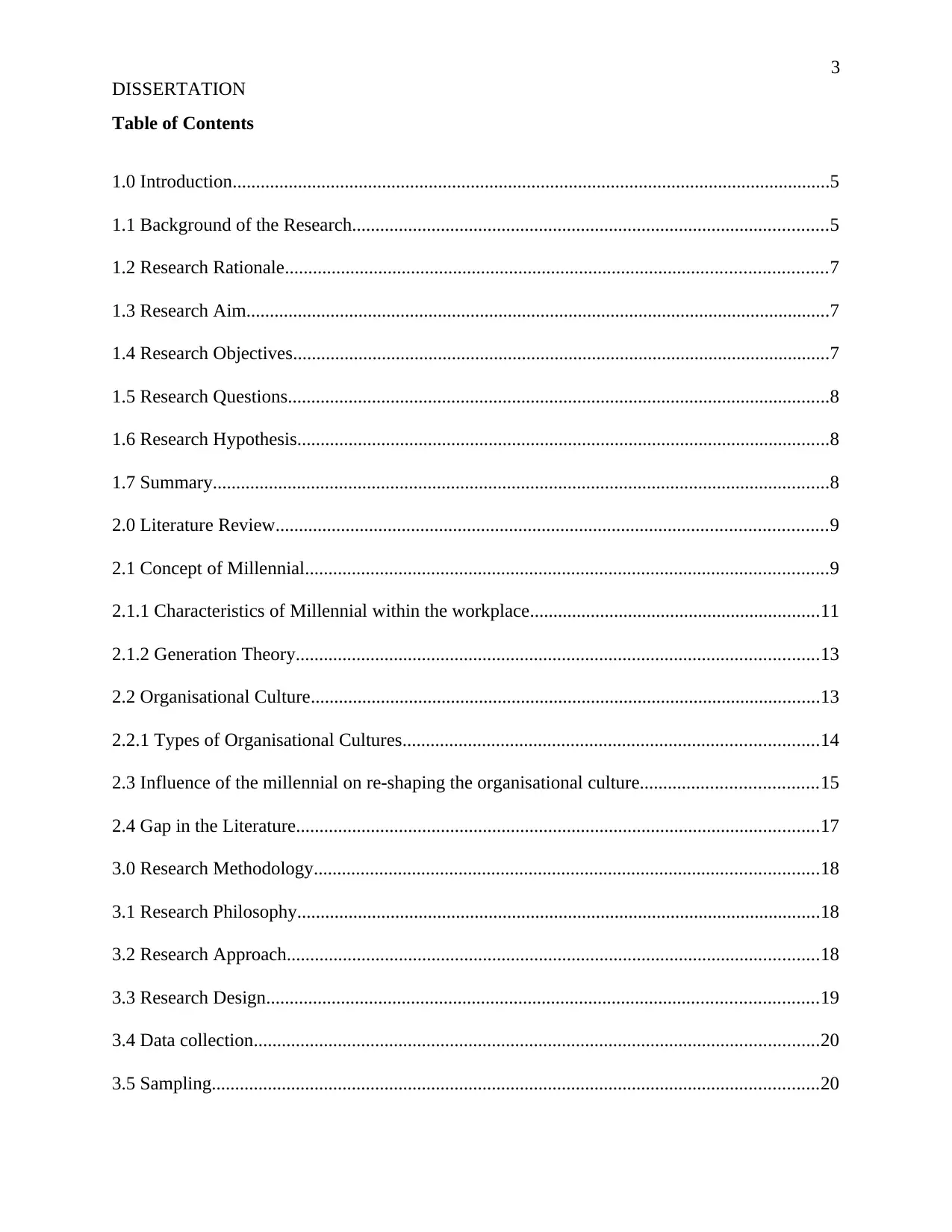
3
DISSERTATION
Table of Contents
1.0 Introduction................................................................................................................................5
1.1 Background of the Research......................................................................................................5
1.2 Research Rationale....................................................................................................................7
1.3 Research Aim.............................................................................................................................7
1.4 Research Objectives...................................................................................................................7
1.5 Research Questions....................................................................................................................8
1.6 Research Hypothesis..................................................................................................................8
1.7 Summary....................................................................................................................................8
2.0 Literature Review......................................................................................................................9
2.1 Concept of Millennial................................................................................................................9
2.1.1 Characteristics of Millennial within the workplace..............................................................11
2.1.2 Generation Theory................................................................................................................13
2.2 Organisational Culture.............................................................................................................13
2.2.1 Types of Organisational Cultures.........................................................................................14
2.3 Influence of the millennial on re-shaping the organisational culture......................................15
2.4 Gap in the Literature................................................................................................................17
3.0 Research Methodology............................................................................................................18
3.1 Research Philosophy................................................................................................................18
3.2 Research Approach..................................................................................................................18
3.3 Research Design......................................................................................................................19
3.4 Data collection.........................................................................................................................20
3.5 Sampling..................................................................................................................................20
DISSERTATION
Table of Contents
1.0 Introduction................................................................................................................................5
1.1 Background of the Research......................................................................................................5
1.2 Research Rationale....................................................................................................................7
1.3 Research Aim.............................................................................................................................7
1.4 Research Objectives...................................................................................................................7
1.5 Research Questions....................................................................................................................8
1.6 Research Hypothesis..................................................................................................................8
1.7 Summary....................................................................................................................................8
2.0 Literature Review......................................................................................................................9
2.1 Concept of Millennial................................................................................................................9
2.1.1 Characteristics of Millennial within the workplace..............................................................11
2.1.2 Generation Theory................................................................................................................13
2.2 Organisational Culture.............................................................................................................13
2.2.1 Types of Organisational Cultures.........................................................................................14
2.3 Influence of the millennial on re-shaping the organisational culture......................................15
2.4 Gap in the Literature................................................................................................................17
3.0 Research Methodology............................................................................................................18
3.1 Research Philosophy................................................................................................................18
3.2 Research Approach..................................................................................................................18
3.3 Research Design......................................................................................................................19
3.4 Data collection.........................................................................................................................20
3.5 Sampling..................................................................................................................................20
Paraphrase This Document
Need a fresh take? Get an instant paraphrase of this document with our AI Paraphraser
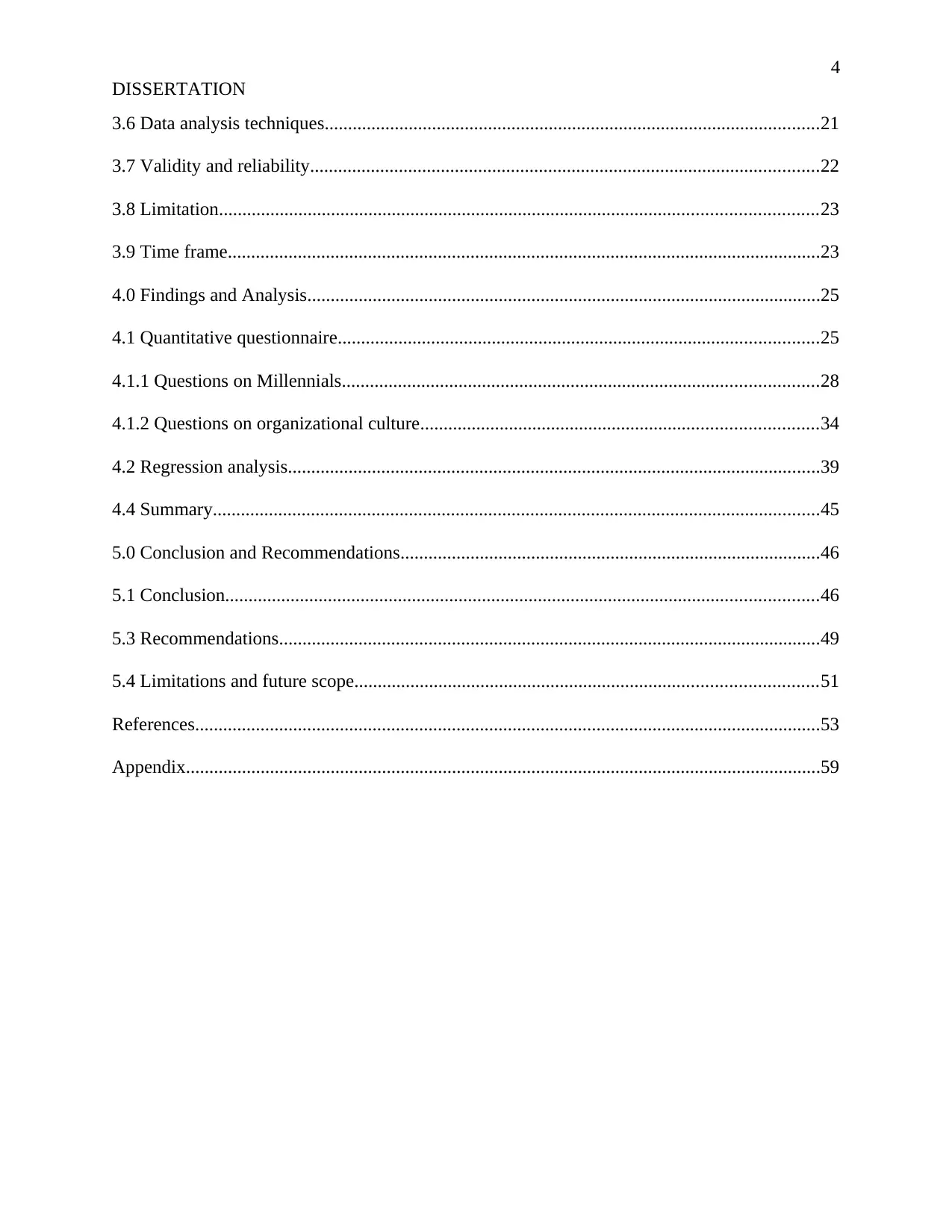
4
DISSERTATION
3.6 Data analysis techniques..........................................................................................................21
3.7 Validity and reliability.............................................................................................................22
3.8 Limitation................................................................................................................................23
3.9 Time frame...............................................................................................................................23
4.0 Findings and Analysis..............................................................................................................25
4.1 Quantitative questionnaire.......................................................................................................25
4.1.1 Questions on Millennials......................................................................................................28
4.1.2 Questions on organizational culture.....................................................................................34
4.2 Regression analysis..................................................................................................................39
4.4 Summary..................................................................................................................................45
5.0 Conclusion and Recommendations..........................................................................................46
5.1 Conclusion...............................................................................................................................46
5.3 Recommendations....................................................................................................................49
5.4 Limitations and future scope...................................................................................................51
References......................................................................................................................................53
Appendix........................................................................................................................................59
DISSERTATION
3.6 Data analysis techniques..........................................................................................................21
3.7 Validity and reliability.............................................................................................................22
3.8 Limitation................................................................................................................................23
3.9 Time frame...............................................................................................................................23
4.0 Findings and Analysis..............................................................................................................25
4.1 Quantitative questionnaire.......................................................................................................25
4.1.1 Questions on Millennials......................................................................................................28
4.1.2 Questions on organizational culture.....................................................................................34
4.2 Regression analysis..................................................................................................................39
4.4 Summary..................................................................................................................................45
5.0 Conclusion and Recommendations..........................................................................................46
5.1 Conclusion...............................................................................................................................46
5.3 Recommendations....................................................................................................................49
5.4 Limitations and future scope...................................................................................................51
References......................................................................................................................................53
Appendix........................................................................................................................................59
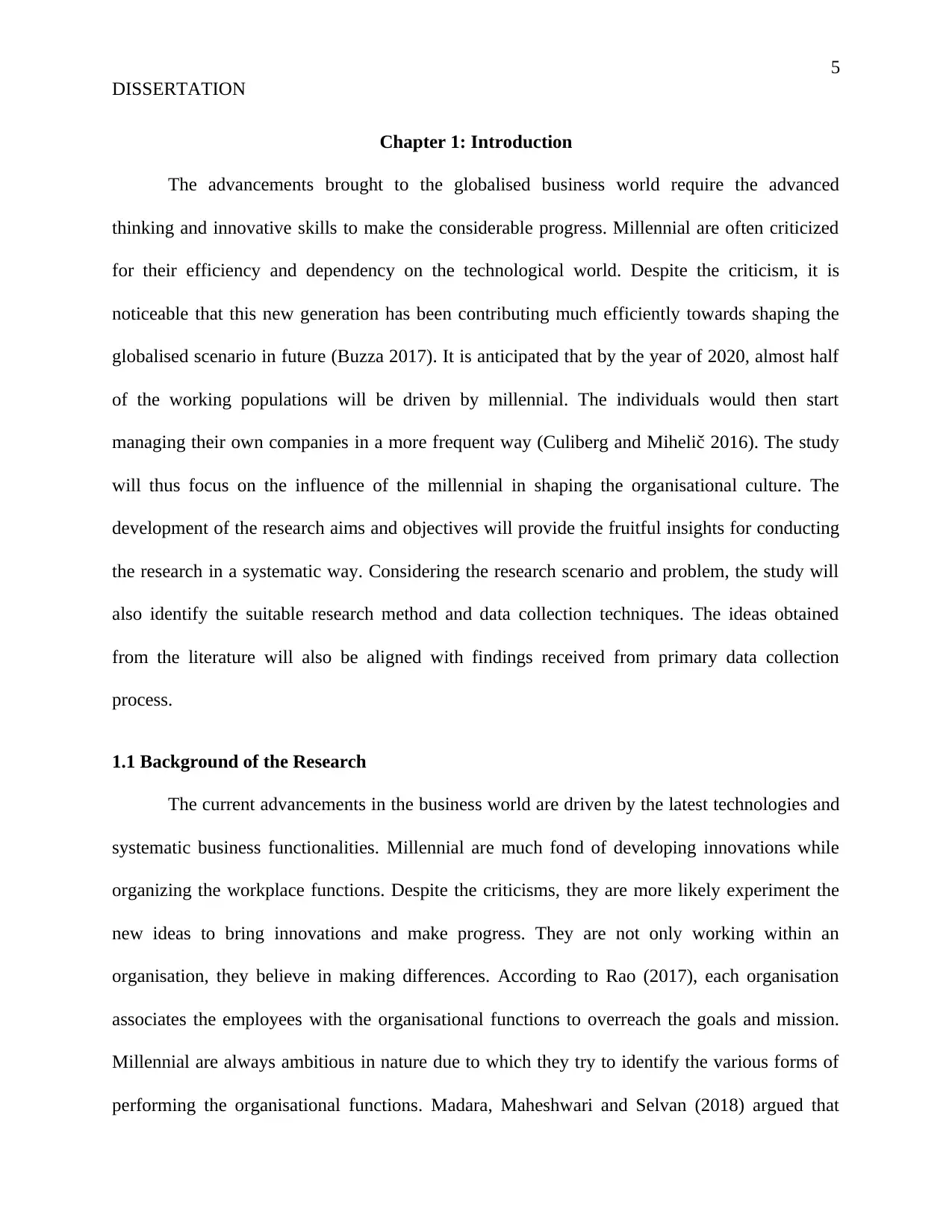
5
DISSERTATION
Chapter 1: Introduction
The advancements brought to the globalised business world require the advanced
thinking and innovative skills to make the considerable progress. Millennial are often criticized
for their efficiency and dependency on the technological world. Despite the criticism, it is
noticeable that this new generation has been contributing much efficiently towards shaping the
globalised scenario in future (Buzza 2017). It is anticipated that by the year of 2020, almost half
of the working populations will be driven by millennial. The individuals would then start
managing their own companies in a more frequent way (Culiberg and Mihelič 2016). The study
will thus focus on the influence of the millennial in shaping the organisational culture. The
development of the research aims and objectives will provide the fruitful insights for conducting
the research in a systematic way. Considering the research scenario and problem, the study will
also identify the suitable research method and data collection techniques. The ideas obtained
from the literature will also be aligned with findings received from primary data collection
process.
1.1 Background of the Research
The current advancements in the business world are driven by the latest technologies and
systematic business functionalities. Millennial are much fond of developing innovations while
organizing the workplace functions. Despite the criticisms, they are more likely experiment the
new ideas to bring innovations and make progress. They are not only working within an
organisation, they believe in making differences. According to Rao (2017), each organisation
associates the employees with the organisational functions to overreach the goals and mission.
Millennial are always ambitious in nature due to which they try to identify the various forms of
performing the organisational functions. Madara, Maheshwari and Selvan (2018) argued that
DISSERTATION
Chapter 1: Introduction
The advancements brought to the globalised business world require the advanced
thinking and innovative skills to make the considerable progress. Millennial are often criticized
for their efficiency and dependency on the technological world. Despite the criticism, it is
noticeable that this new generation has been contributing much efficiently towards shaping the
globalised scenario in future (Buzza 2017). It is anticipated that by the year of 2020, almost half
of the working populations will be driven by millennial. The individuals would then start
managing their own companies in a more frequent way (Culiberg and Mihelič 2016). The study
will thus focus on the influence of the millennial in shaping the organisational culture. The
development of the research aims and objectives will provide the fruitful insights for conducting
the research in a systematic way. Considering the research scenario and problem, the study will
also identify the suitable research method and data collection techniques. The ideas obtained
from the literature will also be aligned with findings received from primary data collection
process.
1.1 Background of the Research
The current advancements in the business world are driven by the latest technologies and
systematic business functionalities. Millennial are much fond of developing innovations while
organizing the workplace functions. Despite the criticisms, they are more likely experiment the
new ideas to bring innovations and make progress. They are not only working within an
organisation, they believe in making differences. According to Rao (2017), each organisation
associates the employees with the organisational functions to overreach the goals and mission.
Millennial are always ambitious in nature due to which they try to identify the various forms of
performing the organisational functions. Madara, Maheshwari and Selvan (2018) argued that
⊘ This is a preview!⊘
Do you want full access?
Subscribe today to unlock all pages.

Trusted by 1+ million students worldwide
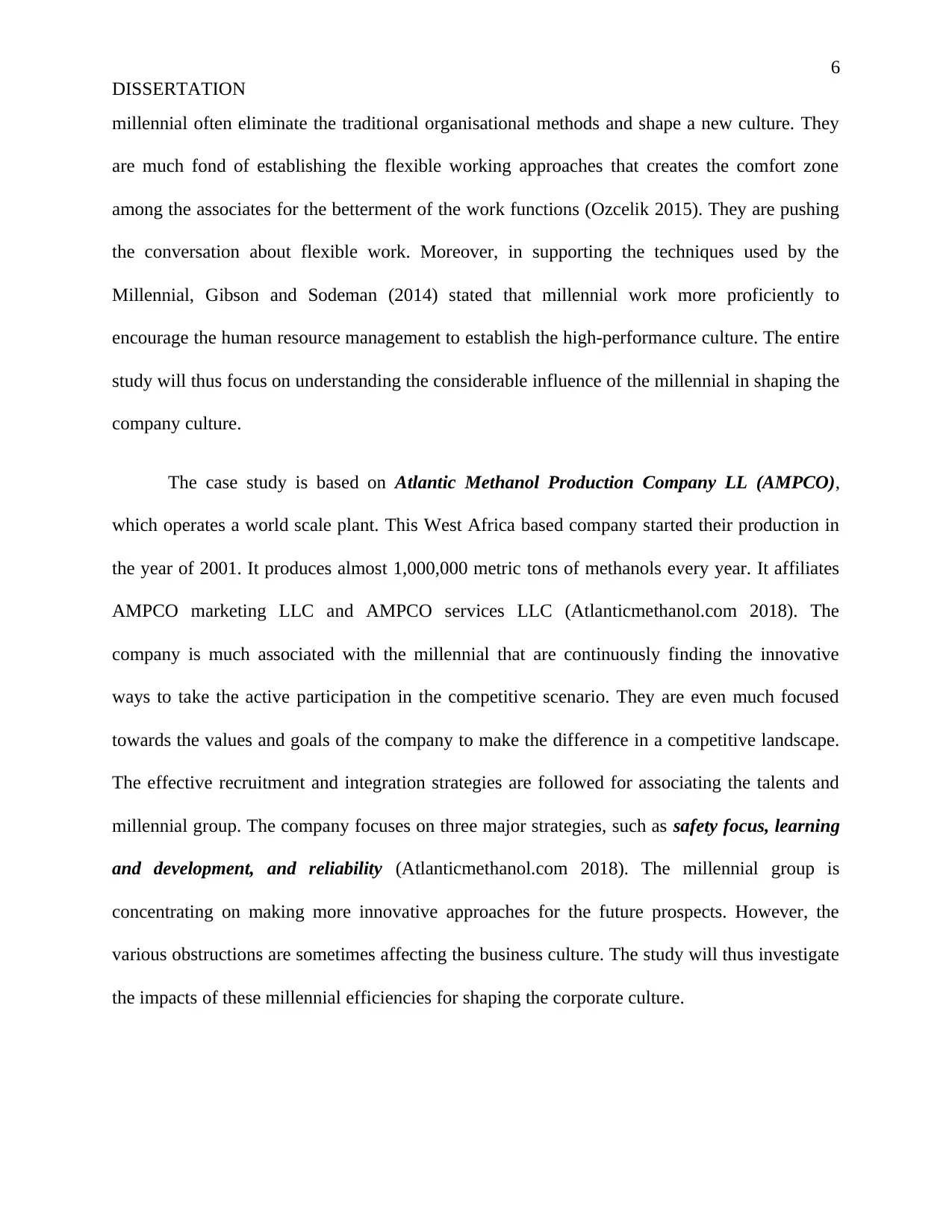
6
DISSERTATION
millennial often eliminate the traditional organisational methods and shape a new culture. They
are much fond of establishing the flexible working approaches that creates the comfort zone
among the associates for the betterment of the work functions (Ozcelik 2015). They are pushing
the conversation about flexible work. Moreover, in supporting the techniques used by the
Millennial, Gibson and Sodeman (2014) stated that millennial work more proficiently to
encourage the human resource management to establish the high-performance culture. The entire
study will thus focus on understanding the considerable influence of the millennial in shaping the
company culture.
The case study is based on Atlantic Methanol Production Company LL (AMPCO),
which operates a world scale plant. This West Africa based company started their production in
the year of 2001. It produces almost 1,000,000 metric tons of methanols every year. It affiliates
AMPCO marketing LLC and AMPCO services LLC (Atlanticmethanol.com 2018). The
company is much associated with the millennial that are continuously finding the innovative
ways to take the active participation in the competitive scenario. They are even much focused
towards the values and goals of the company to make the difference in a competitive landscape.
The effective recruitment and integration strategies are followed for associating the talents and
millennial group. The company focuses on three major strategies, such as safety focus, learning
and development, and reliability (Atlanticmethanol.com 2018). The millennial group is
concentrating on making more innovative approaches for the future prospects. However, the
various obstructions are sometimes affecting the business culture. The study will thus investigate
the impacts of these millennial efficiencies for shaping the corporate culture.
DISSERTATION
millennial often eliminate the traditional organisational methods and shape a new culture. They
are much fond of establishing the flexible working approaches that creates the comfort zone
among the associates for the betterment of the work functions (Ozcelik 2015). They are pushing
the conversation about flexible work. Moreover, in supporting the techniques used by the
Millennial, Gibson and Sodeman (2014) stated that millennial work more proficiently to
encourage the human resource management to establish the high-performance culture. The entire
study will thus focus on understanding the considerable influence of the millennial in shaping the
company culture.
The case study is based on Atlantic Methanol Production Company LL (AMPCO),
which operates a world scale plant. This West Africa based company started their production in
the year of 2001. It produces almost 1,000,000 metric tons of methanols every year. It affiliates
AMPCO marketing LLC and AMPCO services LLC (Atlanticmethanol.com 2018). The
company is much associated with the millennial that are continuously finding the innovative
ways to take the active participation in the competitive scenario. They are even much focused
towards the values and goals of the company to make the difference in a competitive landscape.
The effective recruitment and integration strategies are followed for associating the talents and
millennial group. The company focuses on three major strategies, such as safety focus, learning
and development, and reliability (Atlanticmethanol.com 2018). The millennial group is
concentrating on making more innovative approaches for the future prospects. However, the
various obstructions are sometimes affecting the business culture. The study will thus investigate
the impacts of these millennial efficiencies for shaping the corporate culture.
Paraphrase This Document
Need a fresh take? Get an instant paraphrase of this document with our AI Paraphraser
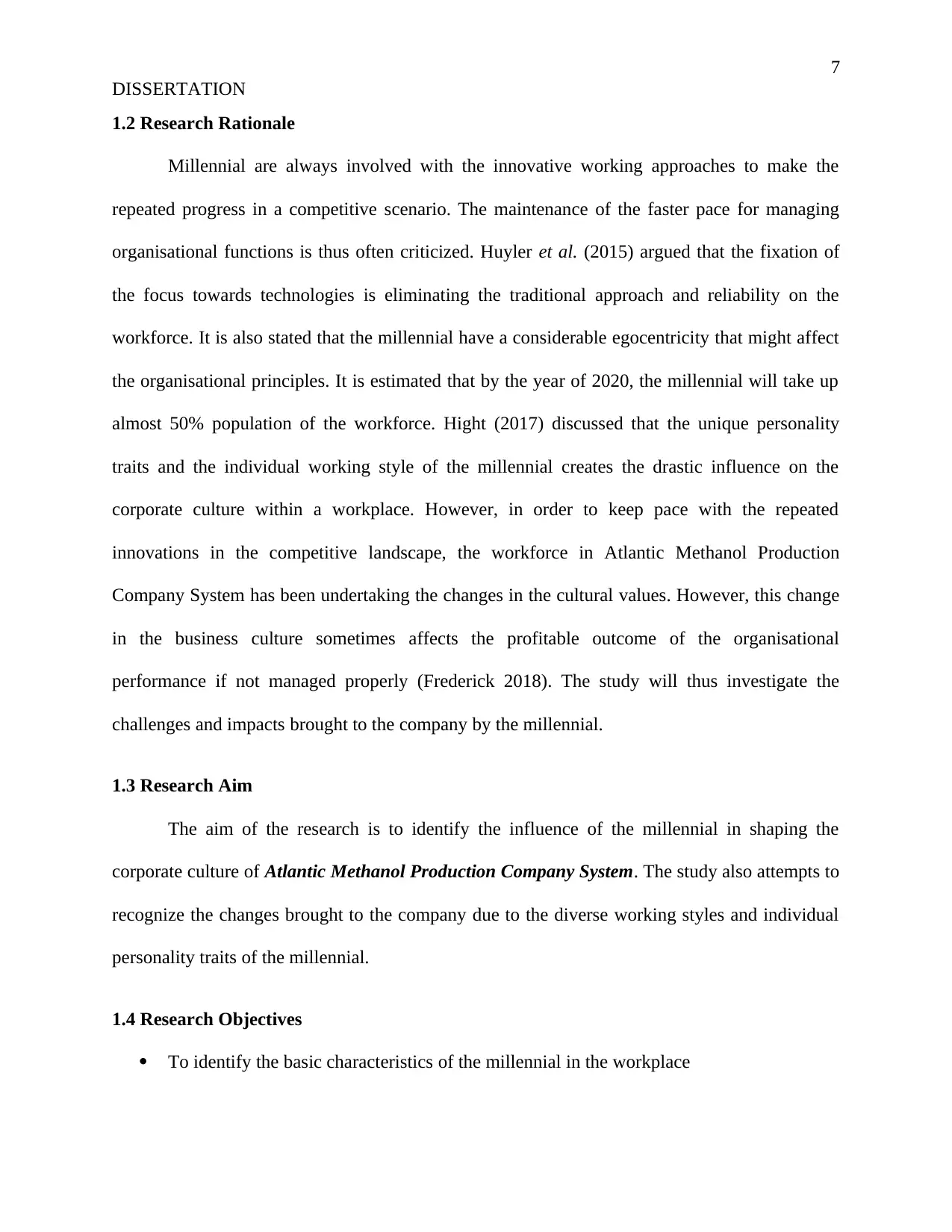
7
DISSERTATION
1.2 Research Rationale
Millennial are always involved with the innovative working approaches to make the
repeated progress in a competitive scenario. The maintenance of the faster pace for managing
organisational functions is thus often criticized. Huyler et al. (2015) argued that the fixation of
the focus towards technologies is eliminating the traditional approach and reliability on the
workforce. It is also stated that the millennial have a considerable egocentricity that might affect
the organisational principles. It is estimated that by the year of 2020, the millennial will take up
almost 50% population of the workforce. Hight (2017) discussed that the unique personality
traits and the individual working style of the millennial creates the drastic influence on the
corporate culture within a workplace. However, in order to keep pace with the repeated
innovations in the competitive landscape, the workforce in Atlantic Methanol Production
Company System has been undertaking the changes in the cultural values. However, this change
in the business culture sometimes affects the profitable outcome of the organisational
performance if not managed properly (Frederick 2018). The study will thus investigate the
challenges and impacts brought to the company by the millennial.
1.3 Research Aim
The aim of the research is to identify the influence of the millennial in shaping the
corporate culture of Atlantic Methanol Production Company System. The study also attempts to
recognize the changes brought to the company due to the diverse working styles and individual
personality traits of the millennial.
1.4 Research Objectives
To identify the basic characteristics of the millennial in the workplace
DISSERTATION
1.2 Research Rationale
Millennial are always involved with the innovative working approaches to make the
repeated progress in a competitive scenario. The maintenance of the faster pace for managing
organisational functions is thus often criticized. Huyler et al. (2015) argued that the fixation of
the focus towards technologies is eliminating the traditional approach and reliability on the
workforce. It is also stated that the millennial have a considerable egocentricity that might affect
the organisational principles. It is estimated that by the year of 2020, the millennial will take up
almost 50% population of the workforce. Hight (2017) discussed that the unique personality
traits and the individual working style of the millennial creates the drastic influence on the
corporate culture within a workplace. However, in order to keep pace with the repeated
innovations in the competitive landscape, the workforce in Atlantic Methanol Production
Company System has been undertaking the changes in the cultural values. However, this change
in the business culture sometimes affects the profitable outcome of the organisational
performance if not managed properly (Frederick 2018). The study will thus investigate the
challenges and impacts brought to the company by the millennial.
1.3 Research Aim
The aim of the research is to identify the influence of the millennial in shaping the
corporate culture of Atlantic Methanol Production Company System. The study also attempts to
recognize the changes brought to the company due to the diverse working styles and individual
personality traits of the millennial.
1.4 Research Objectives
To identify the basic characteristics of the millennial in the workplace
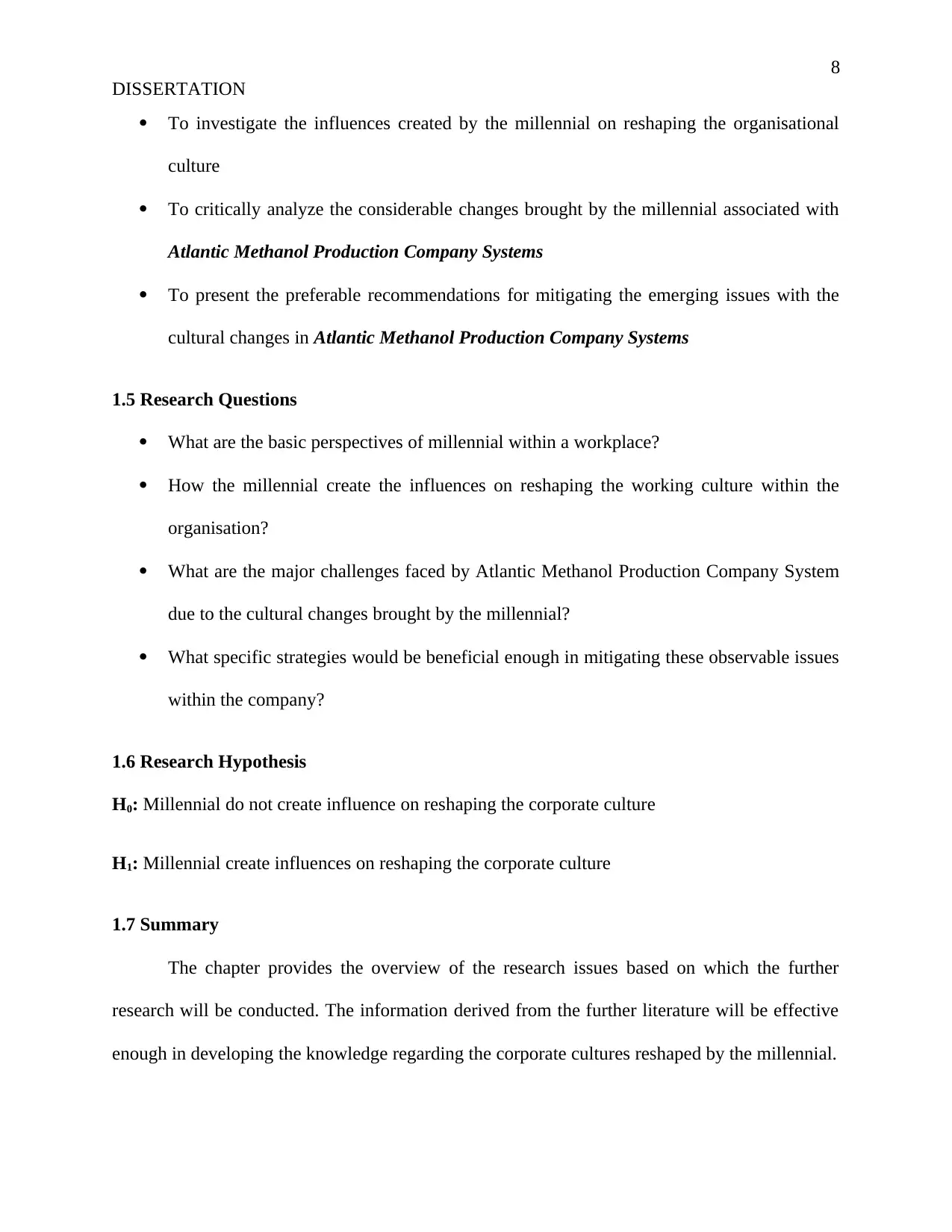
8
DISSERTATION
To investigate the influences created by the millennial on reshaping the organisational
culture
To critically analyze the considerable changes brought by the millennial associated with
Atlantic Methanol Production Company Systems
To present the preferable recommendations for mitigating the emerging issues with the
cultural changes in Atlantic Methanol Production Company Systems
1.5 Research Questions
What are the basic perspectives of millennial within a workplace?
How the millennial create the influences on reshaping the working culture within the
organisation?
What are the major challenges faced by Atlantic Methanol Production Company System
due to the cultural changes brought by the millennial?
What specific strategies would be beneficial enough in mitigating these observable issues
within the company?
1.6 Research Hypothesis
H0: Millennial do not create influence on reshaping the corporate culture
H1: Millennial create influences on reshaping the corporate culture
1.7 Summary
The chapter provides the overview of the research issues based on which the further
research will be conducted. The information derived from the further literature will be effective
enough in developing the knowledge regarding the corporate cultures reshaped by the millennial.
DISSERTATION
To investigate the influences created by the millennial on reshaping the organisational
culture
To critically analyze the considerable changes brought by the millennial associated with
Atlantic Methanol Production Company Systems
To present the preferable recommendations for mitigating the emerging issues with the
cultural changes in Atlantic Methanol Production Company Systems
1.5 Research Questions
What are the basic perspectives of millennial within a workplace?
How the millennial create the influences on reshaping the working culture within the
organisation?
What are the major challenges faced by Atlantic Methanol Production Company System
due to the cultural changes brought by the millennial?
What specific strategies would be beneficial enough in mitigating these observable issues
within the company?
1.6 Research Hypothesis
H0: Millennial do not create influence on reshaping the corporate culture
H1: Millennial create influences on reshaping the corporate culture
1.7 Summary
The chapter provides the overview of the research issues based on which the further
research will be conducted. The information derived from the further literature will be effective
enough in developing the knowledge regarding the corporate cultures reshaped by the millennial.
⊘ This is a preview!⊘
Do you want full access?
Subscribe today to unlock all pages.

Trusted by 1+ million students worldwide
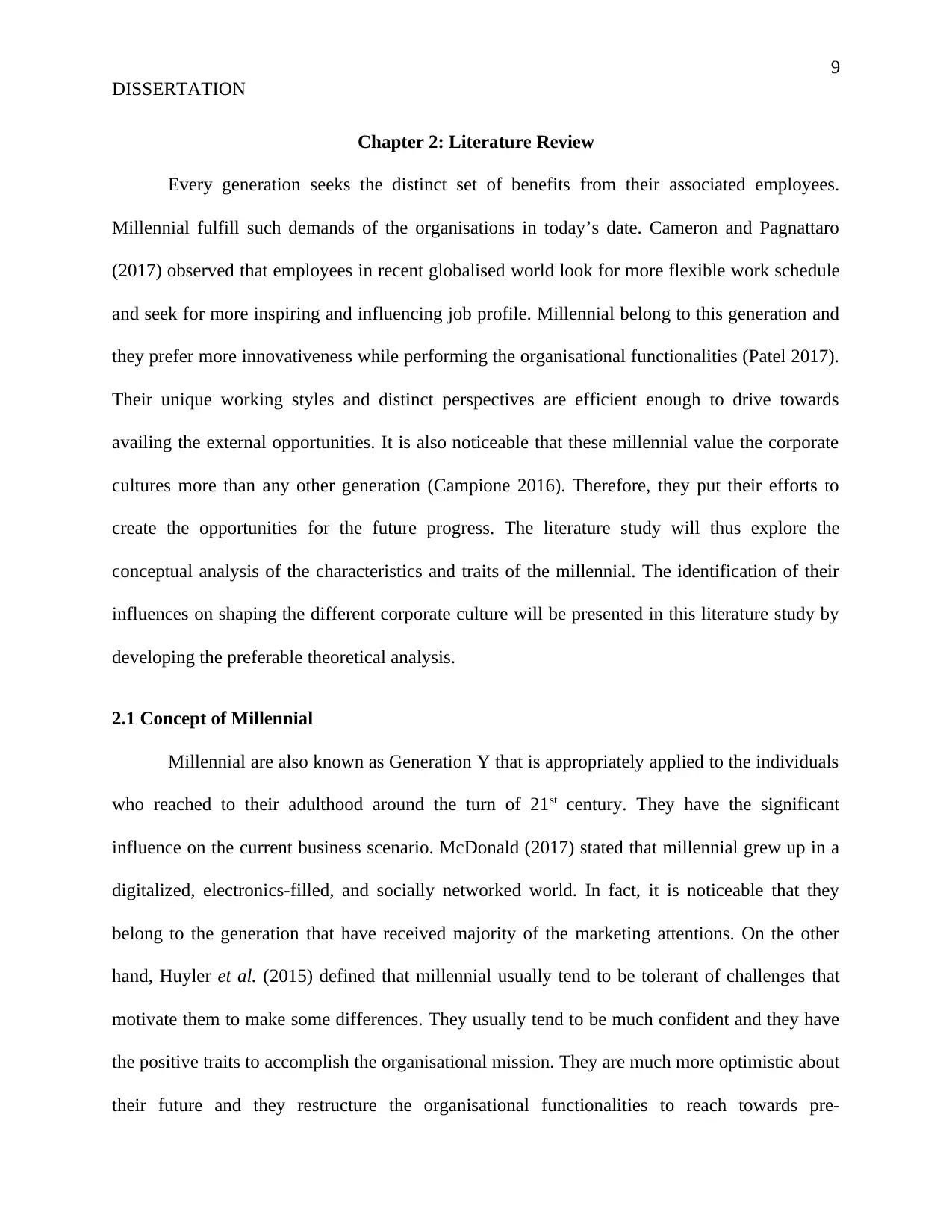
9
DISSERTATION
Chapter 2: Literature Review
Every generation seeks the distinct set of benefits from their associated employees.
Millennial fulfill such demands of the organisations in today’s date. Cameron and Pagnattaro
(2017) observed that employees in recent globalised world look for more flexible work schedule
and seek for more inspiring and influencing job profile. Millennial belong to this generation and
they prefer more innovativeness while performing the organisational functionalities (Patel 2017).
Their unique working styles and distinct perspectives are efficient enough to drive towards
availing the external opportunities. It is also noticeable that these millennial value the corporate
cultures more than any other generation (Campione 2016). Therefore, they put their efforts to
create the opportunities for the future progress. The literature study will thus explore the
conceptual analysis of the characteristics and traits of the millennial. The identification of their
influences on shaping the different corporate culture will be presented in this literature study by
developing the preferable theoretical analysis.
2.1 Concept of Millennial
Millennial are also known as Generation Y that is appropriately applied to the individuals
who reached to their adulthood around the turn of 21st century. They have the significant
influence on the current business scenario. McDonald (2017) stated that millennial grew up in a
digitalized, electronics-filled, and socially networked world. In fact, it is noticeable that they
belong to the generation that have received majority of the marketing attentions. On the other
hand, Huyler et al. (2015) defined that millennial usually tend to be tolerant of challenges that
motivate them to make some differences. They usually tend to be much confident and they have
the positive traits to accomplish the organisational mission. They are much more optimistic about
their future and they restructure the organisational functionalities to reach towards pre-
DISSERTATION
Chapter 2: Literature Review
Every generation seeks the distinct set of benefits from their associated employees.
Millennial fulfill such demands of the organisations in today’s date. Cameron and Pagnattaro
(2017) observed that employees in recent globalised world look for more flexible work schedule
and seek for more inspiring and influencing job profile. Millennial belong to this generation and
they prefer more innovativeness while performing the organisational functionalities (Patel 2017).
Their unique working styles and distinct perspectives are efficient enough to drive towards
availing the external opportunities. It is also noticeable that these millennial value the corporate
cultures more than any other generation (Campione 2016). Therefore, they put their efforts to
create the opportunities for the future progress. The literature study will thus explore the
conceptual analysis of the characteristics and traits of the millennial. The identification of their
influences on shaping the different corporate culture will be presented in this literature study by
developing the preferable theoretical analysis.
2.1 Concept of Millennial
Millennial are also known as Generation Y that is appropriately applied to the individuals
who reached to their adulthood around the turn of 21st century. They have the significant
influence on the current business scenario. McDonald (2017) stated that millennial grew up in a
digitalized, electronics-filled, and socially networked world. In fact, it is noticeable that they
belong to the generation that have received majority of the marketing attentions. On the other
hand, Huyler et al. (2015) defined that millennial usually tend to be tolerant of challenges that
motivate them to make some differences. They usually tend to be much confident and they have
the positive traits to accomplish the organisational mission. They are much more optimistic about
their future and they restructure the organisational functionalities to reach towards pre-
Paraphrase This Document
Need a fresh take? Get an instant paraphrase of this document with our AI Paraphraser
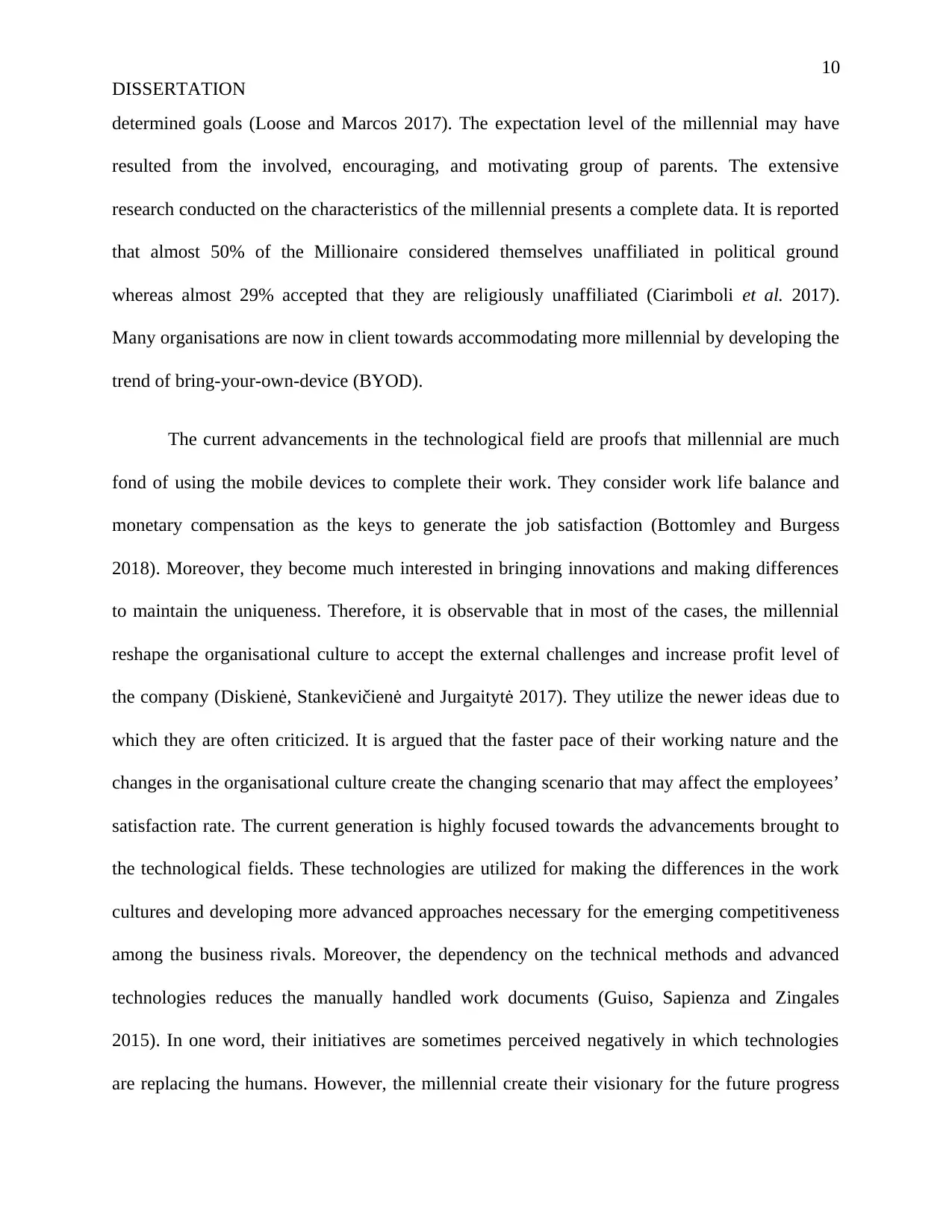
10
DISSERTATION
determined goals (Loose and Marcos 2017). The expectation level of the millennial may have
resulted from the involved, encouraging, and motivating group of parents. The extensive
research conducted on the characteristics of the millennial presents a complete data. It is reported
that almost 50% of the Millionaire considered themselves unaffiliated in political ground
whereas almost 29% accepted that they are religiously unaffiliated (Ciarimboli et al. 2017).
Many organisations are now in client towards accommodating more millennial by developing the
trend of bring-your-own-device (BYOD).
The current advancements in the technological field are proofs that millennial are much
fond of using the mobile devices to complete their work. They consider work life balance and
monetary compensation as the keys to generate the job satisfaction (Bottomley and Burgess
2018). Moreover, they become much interested in bringing innovations and making differences
to maintain the uniqueness. Therefore, it is observable that in most of the cases, the millennial
reshape the organisational culture to accept the external challenges and increase profit level of
the company (Diskienė, Stankevičienė and Jurgaitytė 2017). They utilize the newer ideas due to
which they are often criticized. It is argued that the faster pace of their working nature and the
changes in the organisational culture create the changing scenario that may affect the employees’
satisfaction rate. The current generation is highly focused towards the advancements brought to
the technological fields. These technologies are utilized for making the differences in the work
cultures and developing more advanced approaches necessary for the emerging competitiveness
among the business rivals. Moreover, the dependency on the technical methods and advanced
technologies reduces the manually handled work documents (Guiso, Sapienza and Zingales
2015). In one word, their initiatives are sometimes perceived negatively in which technologies
are replacing the humans. However, the millennial create their visionary for the future progress
DISSERTATION
determined goals (Loose and Marcos 2017). The expectation level of the millennial may have
resulted from the involved, encouraging, and motivating group of parents. The extensive
research conducted on the characteristics of the millennial presents a complete data. It is reported
that almost 50% of the Millionaire considered themselves unaffiliated in political ground
whereas almost 29% accepted that they are religiously unaffiliated (Ciarimboli et al. 2017).
Many organisations are now in client towards accommodating more millennial by developing the
trend of bring-your-own-device (BYOD).
The current advancements in the technological field are proofs that millennial are much
fond of using the mobile devices to complete their work. They consider work life balance and
monetary compensation as the keys to generate the job satisfaction (Bottomley and Burgess
2018). Moreover, they become much interested in bringing innovations and making differences
to maintain the uniqueness. Therefore, it is observable that in most of the cases, the millennial
reshape the organisational culture to accept the external challenges and increase profit level of
the company (Diskienė, Stankevičienė and Jurgaitytė 2017). They utilize the newer ideas due to
which they are often criticized. It is argued that the faster pace of their working nature and the
changes in the organisational culture create the changing scenario that may affect the employees’
satisfaction rate. The current generation is highly focused towards the advancements brought to
the technological fields. These technologies are utilized for making the differences in the work
cultures and developing more advanced approaches necessary for the emerging competitiveness
among the business rivals. Moreover, the dependency on the technical methods and advanced
technologies reduces the manually handled work documents (Guiso, Sapienza and Zingales
2015). In one word, their initiatives are sometimes perceived negatively in which technologies
are replacing the humans. However, the millennial create their visionary for the future progress
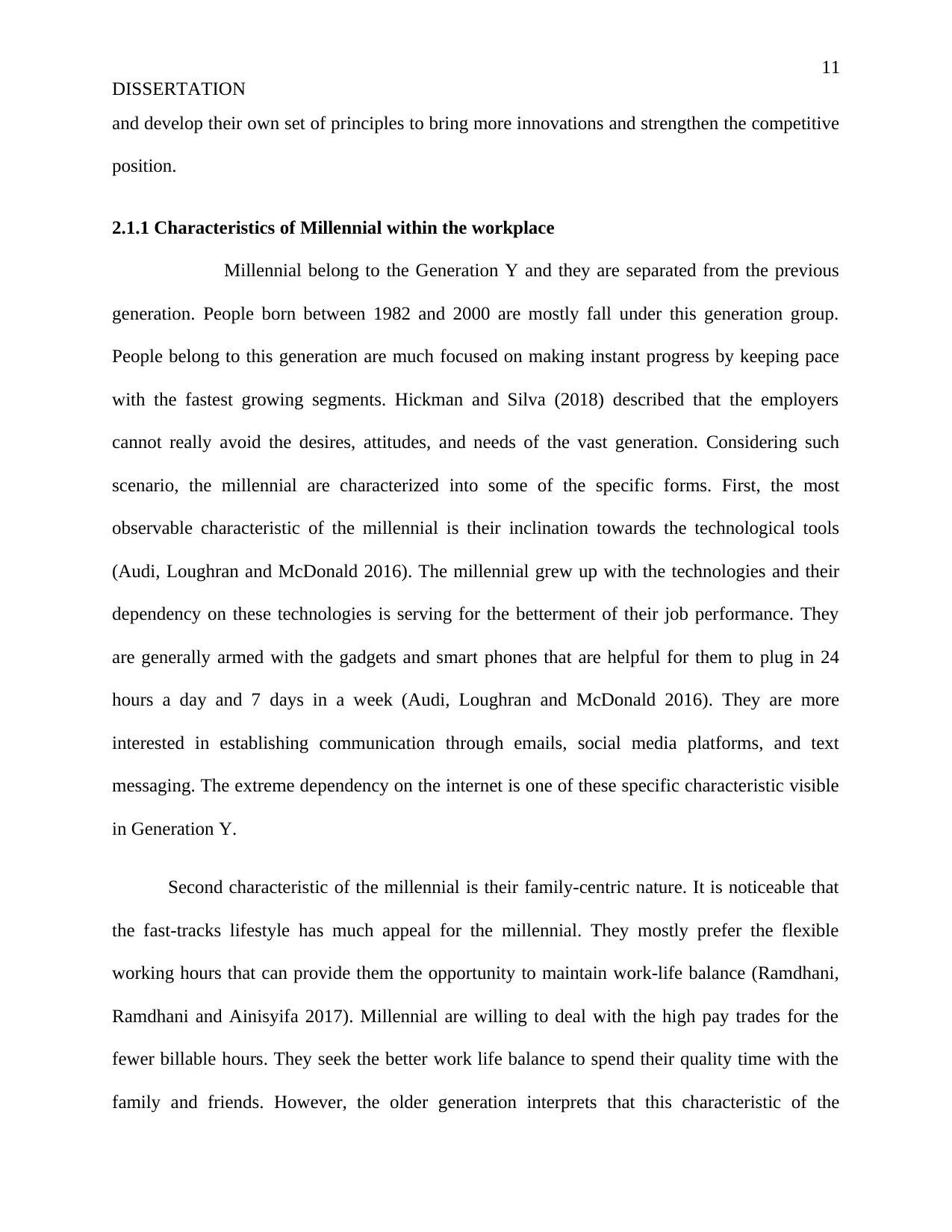
11
DISSERTATION
and develop their own set of principles to bring more innovations and strengthen the competitive
position.
2.1.1 Characteristics of Millennial within the workplace
Millennial belong to the Generation Y and they are separated from the previous
generation. People born between 1982 and 2000 are mostly fall under this generation group.
People belong to this generation are much focused on making instant progress by keeping pace
with the fastest growing segments. Hickman and Silva (2018) described that the employers
cannot really avoid the desires, attitudes, and needs of the vast generation. Considering such
scenario, the millennial are characterized into some of the specific forms. First, the most
observable characteristic of the millennial is their inclination towards the technological tools
(Audi, Loughran and McDonald 2016). The millennial grew up with the technologies and their
dependency on these technologies is serving for the betterment of their job performance. They
are generally armed with the gadgets and smart phones that are helpful for them to plug in 24
hours a day and 7 days in a week (Audi, Loughran and McDonald 2016). They are more
interested in establishing communication through emails, social media platforms, and text
messaging. The extreme dependency on the internet is one of these specific characteristic visible
in Generation Y.
Second characteristic of the millennial is their family-centric nature. It is noticeable that
the fast-tracks lifestyle has much appeal for the millennial. They mostly prefer the flexible
working hours that can provide them the opportunity to maintain work-life balance (Ramdhani,
Ramdhani and Ainisyifa 2017). Millennial are willing to deal with the high pay trades for the
fewer billable hours. They seek the better work life balance to spend their quality time with the
family and friends. However, the older generation interprets that this characteristic of the
DISSERTATION
and develop their own set of principles to bring more innovations and strengthen the competitive
position.
2.1.1 Characteristics of Millennial within the workplace
Millennial belong to the Generation Y and they are separated from the previous
generation. People born between 1982 and 2000 are mostly fall under this generation group.
People belong to this generation are much focused on making instant progress by keeping pace
with the fastest growing segments. Hickman and Silva (2018) described that the employers
cannot really avoid the desires, attitudes, and needs of the vast generation. Considering such
scenario, the millennial are characterized into some of the specific forms. First, the most
observable characteristic of the millennial is their inclination towards the technological tools
(Audi, Loughran and McDonald 2016). The millennial grew up with the technologies and their
dependency on these technologies is serving for the betterment of their job performance. They
are generally armed with the gadgets and smart phones that are helpful for them to plug in 24
hours a day and 7 days in a week (Audi, Loughran and McDonald 2016). They are more
interested in establishing communication through emails, social media platforms, and text
messaging. The extreme dependency on the internet is one of these specific characteristic visible
in Generation Y.
Second characteristic of the millennial is their family-centric nature. It is noticeable that
the fast-tracks lifestyle has much appeal for the millennial. They mostly prefer the flexible
working hours that can provide them the opportunity to maintain work-life balance (Ramdhani,
Ramdhani and Ainisyifa 2017). Millennial are willing to deal with the high pay trades for the
fewer billable hours. They seek the better work life balance to spend their quality time with the
family and friends. However, the older generation interprets that this characteristic of the
⊘ This is a preview!⊘
Do you want full access?
Subscribe today to unlock all pages.

Trusted by 1+ million students worldwide
1 out of 65
Related Documents
Your All-in-One AI-Powered Toolkit for Academic Success.
+13062052269
info@desklib.com
Available 24*7 on WhatsApp / Email
![[object Object]](/_next/static/media/star-bottom.7253800d.svg)
Unlock your academic potential
Copyright © 2020–2026 A2Z Services. All Rights Reserved. Developed and managed by ZUCOL.





